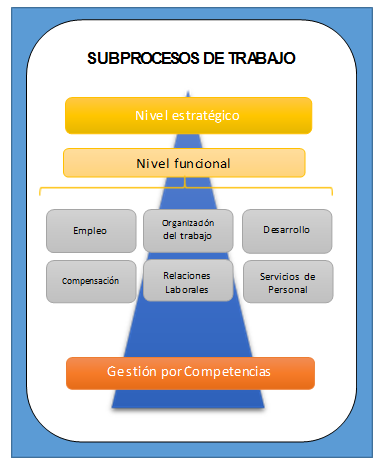Human Resources Department
The Human Resources Department is in charge of the processes needed to direct the human talent at Instituto Costarricense de Turismo (Costa Rican Institute of Tourism), starting with recruitment, selection, training, performance evaluation, rewards and the general well-being of the employees, all for the sake of productivity, transparency and the achievement of objectives and institutional goals.
Human Resources Structure Department
Instituto Costarricense de Turismo
July 2016

The Human Resources Work Sub Process Components are detailed as follows:
- Strategic Level: Made up by Management and Coordination. It considers the existence of active human resources planning, at a short, medium and long term time span, which prioritizes the quantitative and qualitative needs, based on diagnostic tools in order to incorporate, in a centralized way, the priorities and strategic orientations with correct budget management.
- Functional Level: Responsible for the execution of functions and their own sub process operations, related specifically with Employment, Organization of the work, Development, Compensation, Labor Relations and Personnel Services, made up by the practice of stages and functions of what each of them should develop, such as the quota functional support of the needed strategic level.
Human Resources Work Sub process:
Work Sub process
Has the function to manage the set of practices by which workers can accomplish the following: achievement with their training period and adjustment, perform brand registration, submit their validated degree certificates and proceed with the disengagement process to ICT. Likewise, it includes all the tasks related to the inhibited registration, caution, Declared Jurisdictions System and Final Management Reports requested by the Contraloría General de la Republica (Controller General of the Republic).
- Induction: Formal and structured Induction process, that covers general ICT features, through which all new employees undergo.
- Probationary period evaluation: Adjustment time for the employee with the company and their position. (First three months)
- Work Attendance Control: Follow up with the established Autonomous Work Regulations and guidelines, associated with brand registration and exoneration, vacation and work from home time.
- Career Review: Process that is followed to determine and dictate by means of a study, and the information related to the workers’ career background.
- Disengagement: o Integrates the Human Resources policies and practices related to the termination of the working relationship, whether due to disciplinary causes, resignation, internal mobility or promotion (Transfers, relocations, promotions) or for retirement reasons. This element will have a support function for the Personnel Services process. (Proyecto de Jubilación de la Caja Costarricense de Seguro Social) (Retirement Project of the Costa Rican Social Security Office)
Work Organization Sub process
Responsible for the recruitment, selection and hiring process, maintenance and updating of the job classification system, design of job positions that involve the descriptions of the activities, functions, responsibilities and the purpose that the organization assigns to them, all of which; lead to the generation of competitive profiles, such as; the occupational analysis of each employee based on their position, responsibility level and role involvement.
- Recruiting: o Tends to recruitment activities by using the written communication, via WEB and intranet, depending on the case, applying controls and technical analysis of the results.
- Selection and Hiring: o The current selection actions are based on the Institutional Job Description Manuals (v.2006), people who are hired go through a formal successful selection process (either internal or external).
- Job Description Manual Design: Involves a description of the activities, functions, responsibilities and purposes that are assigned to each position by the organization, and that jointly, set up the framework in which the occupant must develop their contribution and obtain the expected results. The implementation of the design stage of the Competitive Job Description Manual, will be timely input for this process.
- Profiles: Definition of the positions for the candidates, comprised of the identification of the basic skills that they should collect.
- Occupational Analysis: Process that is followed to determine and dictate through observation, interview and study, the information related to performance characteristics of the employees in a position. (Reassignment studies, annuities, five year periods, full working time, professional assignment amongst others)
Development Sub process
In charge of the permanent and continuous search of the encouragement for workers’ professional growth, considering among other facts their talent by stimulating the learning which is required, such as; institutional internal career itinerary that allows them to relate to different profiles, expectations and individual preferences with the requirements, priority and strategic needs of the organization.
- Institutional Training Plan (PIC): IIncludes training activities or relevant courses and/or specific ones that are requests generated by every unit considering what has been already established in the ICT Training Regulations. The execution of the subsystem detection of training needs, will offer important tools for this process.
- Institutional Succession Plan (PIS): Po Project that allows business continuity, considering positions already occupied by key workers that are about to leave ICT due to retirement, or; due to strategic positions that don’t allow vacancies, which will be replaced by workers that don’t have headquarter positions or who are a coordinators in charge of personnel, but have similar value and that could also develop the skills in an average time period, taking their current position into consideration, working time at the institution as well as their performance evaluation.
- Training: Accounts for the efforts made in regards to training material and sills development, to assure the best performance by the current position or the workers’ aptitude and prepare them for further promotions.
Compensation Sub process
Includes in its scope the intervention of activities related to the set of remunerated (non-salary and salary-wise) and non–remunerated compensations that the organization provides its workers for the provision of services. Under this frame of reference, a strict fulfillment of policies and guidelines is incorporated, in the matter of the current adjustment and it is also issued by the Technical Secretary of the Budgetary Authority according to the delegated powers, activities such as proposed wage structures (fixed, basic and others), salary management, in general, everything that might support the definition of policies that are linked to a global compensation strategy.
Labor Relationship Sub process
In the performance of its duties, it should procure that the established relationships between the organization and its workers are outlined in a collective and cohesive way, accomplish activities related to monitoring the organizational climate, practical ascending and descending communication, maintenance and improvement of the overall perceived satisfaction of workers, management of labor relationships (which includes disciplinary rule), work conditions, relationship between the organization and social actors (unions, guilds, associations), also includes all those tasks related to the internal control system and risks, control of wage budget. Likewise, the Performance Evaluation functions, feedback given to workers that involves a work commitment plan through the implementation of the Evaluation File.
- Performance Evaluation: Maintains formal conditions and tools for dialogue during the
evaluation process, which allows the delivery of feedback to the worker, by the evaluator, around the
fulfillment of their commitments, in order to promote their strengths, overcome their deficiencies and
contribute to the development of the organization in the improvement of the internal management Evaluation File.
The achievement of the capacity of performance evolution sub-system stage, will provide important input to the
headquarters evaluation process.
- Performance File: Allows planning, measuring and management of the labor commitment on the workers’ behalf, with the necessary documentation to ensure good compliance of these and being a source for the next evaluation.
- Organizational Climate: Makes the connections with the contracted company to facilitate the organizational climate measurement, which leads the interdepartmental team called C-Team, that will be in charge of the action plan topics and awareness of possible solutions.
Staff Services Sub process
- Work Attendance Control: Receives all the documentation submitted by the worker to the DRH input for the Compensation process, such as: medical leave, liability, vacation, leave of absence with or without payment, amongst others.
Documentation
-
-
-
-
-
-
-
-
-
-
-
pdf Plan de empleo 2025 Popular
-
pdf Plan de empleo 2026 Popular
-
-
pdf Salarios de personas funcionarias Popular
Information about available places
At this time there are no places available.
Job openings
At this time there are no Job openings
2014
pdf Licenciado César Andrés Solís Salazar, Miembro Junta Directiva (Octubre 2012 - Mayo 2014)(1.55 MB)
pdf MBA Fernando J. Rivera Solano, Coordinador Auditoría Interna (Noviembre 2006 - Abril 2014)(3.86 MB)
pdf Licenciada Lourdes Fernández Mora, Miembro Junta Directiva (Junio 2006 – Mayo 2014)(4.42 MB)
pdf Informe Final de Labores Lic. Allan Flores Moya, Ex Ministro de Turismo(2.02 MB)
pdf Licenciado Hermes Navarro del Valle, Líder del Macroproceso de Gestión y Asesoría Turística (2011-2014)(6.36 MB)
2015
pdf Arq. Marcel Soler Rubio, Miembro CIMAT (Junio 2014-Setiembre 2015).(1.00 MB)
pdf Sr. Wilhelm von Breymann B., Ministro de Turismo (08-05-2014 – 21-04-2015)(966 KB)
pdf MSc Viviana Rudín Castro, Subproceso de Promoción (Enero 2014 - Enero 2015)(818 KB)
pdf Lic. Alexander Soto Ríos, Coordinador Sub-Proceso de Guanacaste Sur (octubre 2009 - Enero 2015)(175 KB)
2016
2017
2018
pdf Lic. Roberto Arce Garita, Miembro del Consejo Director del Polo Turístico Golfo de Papagayo, (Jun, 2017-Abr. 2018)(3.36 MB)
pdf Sr. Mauricio Ventura Aragón, (Mayo, 2015-Abr. 2018)(336 KB)
pdf Lic. Rolando Campos Corrales , Miembro de Junta Directiva, (Dic, 2010-Mayo. 2018)(656 KB)
pdf Lic. Erasmo Rojas Madrigal, Miembro de la Junta Directiva del ICT (Nov, 2016-May. 2018)(2.19 MB)
pdf Sr. Erasmo Rojas Madrigal , Miembro del Consejo Director del Proyecto Turístico Golfo de Papagayo (Dic, 2017-May. 2018)(334 KB)
pdf Licda. Patricia Forero Cabezas , Miembro de Junta Directiva, (Jun., 2010-Mayo. 2018)(6.55 MB)
pdf Alcides Mora Sánchez, Jefe, Departamento Administrativo del ICT ( ene, 2007- jun. 2018)(2.78 MB)
2019
pdf Sra. Celia Quintana Madriz, Consejo Director Papagayo (Abril - Diciembre 2018)(294 KB)
pdf Lic. Sergio Lira Valdivia (setiembre 1999-enero 2019)(161 KB)
pdf Lic. Juan Huertas Cerdas, Jefe Departamento de Ingresos a Febrero 2019(326 KB)
pdf Lic. Hermes Navarro, Consejo Director Papagayo (Junio 2018 – junio 2019)(3.06 MB)

